Norse Mythology - Odin
Odin is a god with hundreds of names, ruler of the Æsir, husband of Frigg, a warrior and a wanderer. He is one of the most complex figures in all of the mythologies. Odin is described as a one-eyed man with a long beard, wearing a shaggy cloak and a broad hat. He is armed with a spear Gungnir and accompanied by several animal companions.
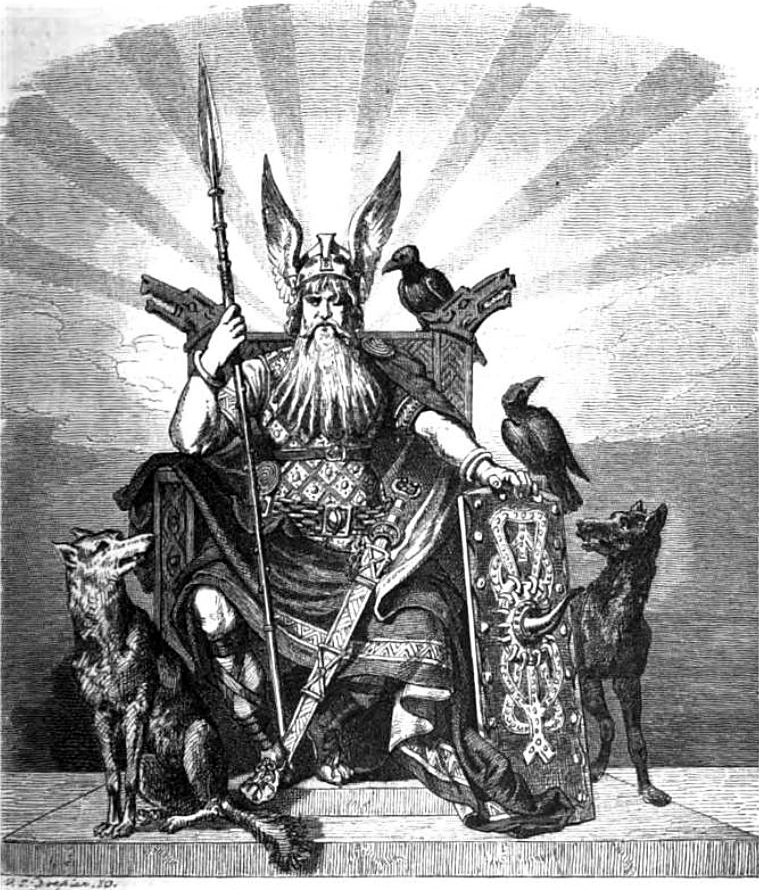
Odin sitting on Hliðskjálf, holding his spear Gungnir, flanked by his ravens Huginn and Muninn and wolves Geri and Freki, Wilhelm Wägner, 1882
He often appears in pop culture as a valorous and just ruler, but his Old Norse followers had a quite different image of Odin. In the old days, Tyr and Thor were considered the honorable gods and commanders of battlefields. Odin himself didn't hold justice and fairness in high regard. He was respected by both the outlaws and warriors as Odin favored those who possessed intelligence, creativity, and competence. In Odin's opinion, the difference between a successful king and skilled criminal was mostly a matter of luck.
Odin is a wise wanderer and trickster who is constantly in search for more wisdom. Besides seeking wisdom he also bestows wisdom on others. He is a ruler of all other gods, yet he often makes deals and decisions for his own interests. Although he is often cursed for his trickery and "selfishness" he is revered both among gods and men, as he is the leader of gods, creator of the world and the one who gave life to humans.
Odin's domains
Odin is associated with many different areas of which some seem contradictory. His complexity is most easily seen through the variety of attributes and followers associated with him.
Wisdom is both his most important virtue and desire. As such he is worshiped by rulers and those who aspire to rule. Odin is always driven to search for wisdom in all things. Although he will stop at nothing to gain any knowledge, he is especially on the hunt for the knowledge which will give him more power and in most cases that power comes in the form of magic. The poem Völuspá from The Poetic Edda gives us a good example of how far Odin was prepared to go in order to gain knowledge. Based on the poem, Odin sacrificed one of his eyes to be granted a sip of waters of Mímisbrunnr, a well which holds secrets of cosmos.
.jpg)
Odin in the guise of a wanderer, Georg von Rosen, 1886
Odin is also one of the two greatest practitioners of shamanism among all gods, as such he is revered by shamans and berserkers. Modern pop culture often associates Odin with all of the warriors, but in reality, most of the non-berserker warriors favored Thor and Tyr. Berserkers were warriors whose technique was closely tied to spiritual practices. Their practices were centered around spiritual unification with ferocious totem animals. As Odin was the master of such beasts that unification also brought unity with Odin. As warrior-shamans, berserkers were the warriors who were under Odin's patronage.
Although Odin wasn't the patron of all the warriors he sent Valkyries to descend on the battlefield and bring half of those who died in battle to Valhalla. Half of the slain belonged to Freya and went to Fólkvangr. Valkyries took Odin's half of the warriors only after Freya has made her pick of the slain warriors. The half that was taken to Valhalla were called einherjar (Old Norse for "once fighters"). Once there einherjar would drink mead and eat their fill of Sæhrímnir, a creature that is killed and eaten every night by the Æsir and Einherjar. Once the Sæhrímnir is eaten it is brought back to life in order to be served for dinner on the next day. In Valhalla einherjar prepare for the events of Ragnarök on a daily basis, and once the Ragnarök comes, they will be led to battle by Odin himself.
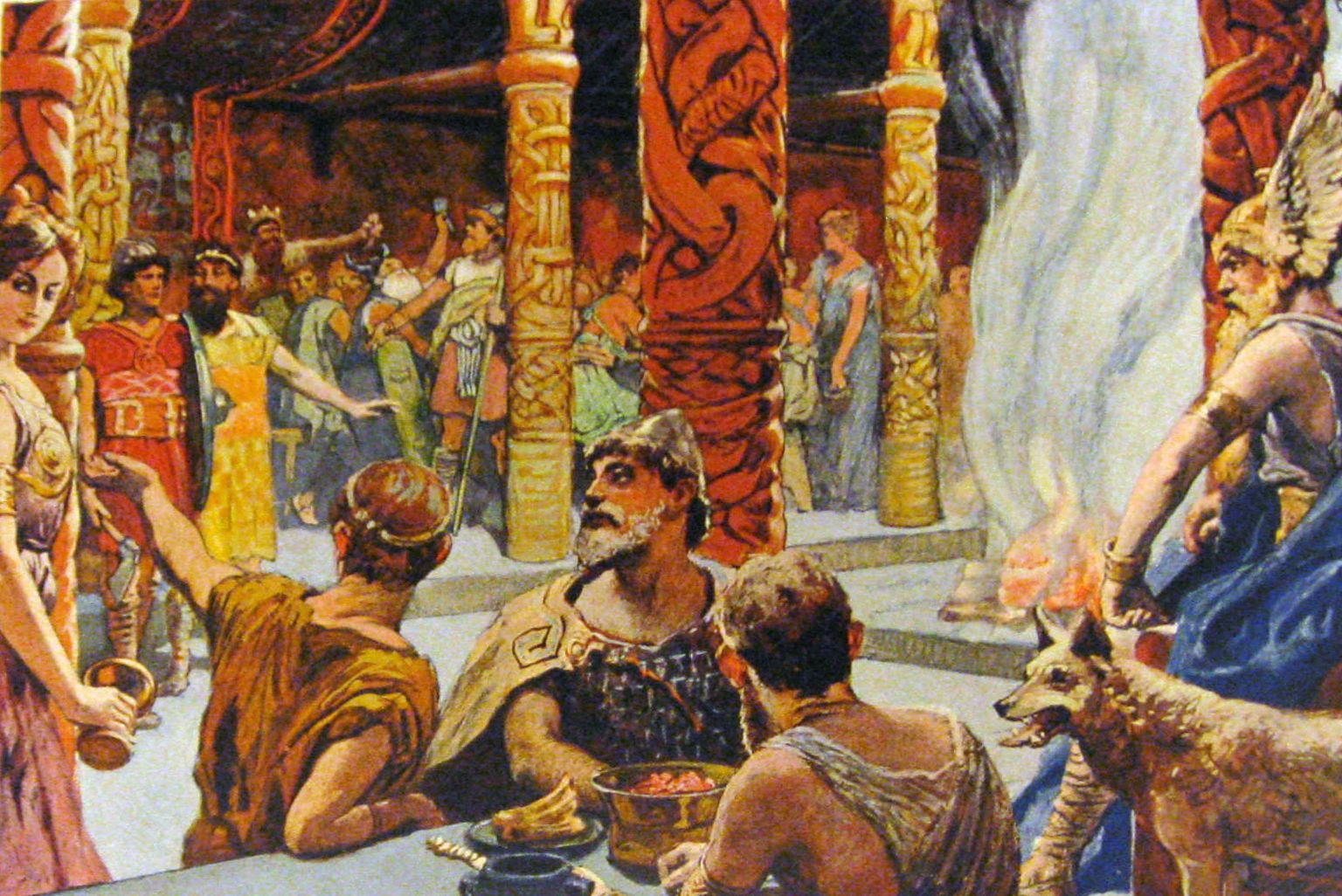
Einherjar are served by Valkyries in Valhalla, Emil Doepler, 1905
Odin was also widely worshiped by poets. On one occasion, Odin spent a good part of the year working for Baugi, a giant whose brother came into possession of the Mead of Poetry. The Mead was created by the dwarfs. The mead had the power to make anyone who drank it a poet or a scholar. Odin worked for Baugi because he was promised to be given the mead. Once Odin's work was finished, Baugi's brother, Suttungr refused to give Odin the mead. Odin stole the mead and gave it to the gods and gifted men thus enabling them to become great poets.
There are many more areas that Odin rules over, here is the list of areas of life that Odin is associated with:
- Wisdom
- Knowledge
- Sorcery
- Battle
- Death
- The Gallows
- Poetry
- Frenzy
- Healing
- Royalty
- The runic alphabet
Etymology and other names
Óðinn (Old Norse), Wōden (Old English and Old Saxon) and Wuotan (Old High German) all derive from the Proto-Germanic Wōđanaz. The noun wōđanaz is developed from the adjective wōđaz. His Old Norse Name is formed from two parts. The noun óðr, and the suffix -inn. Óðr stands for fury, inspiration, and ecstasy, while the suffix -inn can mean "the master of" or "a perfect example of". Which means that literal translation of Odin's name would mean that he is the master and a perfect example of inspiration, fury, and ecstasy.
Besides his main name, Odin is known as the god with hundreds of names. It would be pointless to list them all here as there are close to 200 names recorded for Odin. Some of those names are Odin's descriptive attributes while others refer to religious practices associated with him.
Some of the examples are:
| Aldaföðr | Allfather |
| Asagrim | Lord of the Æsir |
| Báleygr | Flaming Eye |
| Darraðr | Spearman |
| Draugadróttinn | Lord of the undead |
| Fjölnir | The One who is many, concealer |
| Galdraföðr | Father of Magical Songs |
| Gapþrosnir | The one in gaping frenzy |
| Gizurr | Riddler |
| Glapsviðr | Swift in deceit |
| Grímnir | Hooded/Masked one |
| Herteitr | Glad of War |
| Hrafnaguð | Raven God |
| Löndungr | Shaggy Cloak Wearer |
| Rúnatýr | God of Runes |
| Sigtryggr | Sure of victory |
| Skollvaldr | Ruler of treachery |
| Váfuðr | Wanderer |
| Yggr | Terrible One |
It is clear that Odin has many names, but there are also many things named after Odin. The most common term named after Odin is used by every English speaker on a daily basis; Wednesday. *Wednesday derives from Old English Wōdnesdæg which literally means Odin's Day. So in a way each time an English speaker mentions Wednesday they offer a small tribute to the Allfather! ;)
Runes
I have already mentioned that Odin was prepared to do many things, including sacrificing his eye, in order to gain wisdom. The story of how Odin obtained the knowledge of the runes best describes to what extent Odin was willing to go in order to learn. Both The Prose and The Poetic Edda mention a place called The Well of Urd. The well was an unfathomable pond from which some of the most powerful forces and creatures in The Old Norse mythology came. The Trio of Norns were a group of such creatures. The Norns were maidens that, out of all creatures in the cosmos, held the greatest power over destiny. They ruled over destiny with the power of the runes. They would carve the runes in the trunk of the cosmic tree Yggdrasill. Their intentions would then travel along the tree, affecting everything in The Nine Worlds.
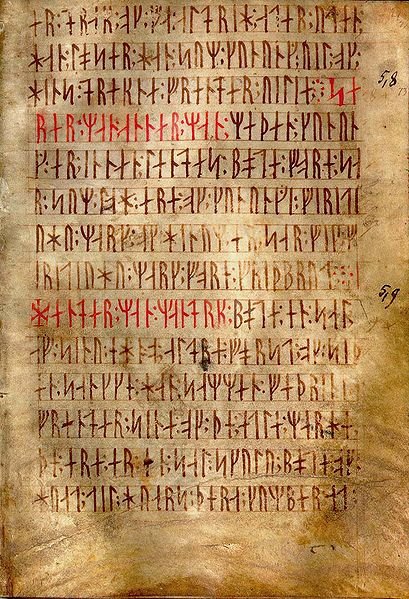
Codex runicus, a vellum manuscript from 1300 written in runes
Odin watched the Norns and hungered for their wisdom and knowledge of the runes. In order to gain knowledge of the runes, Odin decided to make a sacrifice. He hanged himself from the cosmic tree Yggdrasil. He then dedicated a spear to himself and stabbed himself with that spear. Thus he sacrificed himself to himself, making the greatest and the noblest sacrifice possible. He hung from the Yggdrasil for nine nights and nine days without nourishment. While he was hanging, Odin stared into the Well of Urd and called to the runes. Once his ordeal was finished; the runes, an alphabet that contained many of the greatest secrets of existence, revealed themselves to him.
With the knowledge of how to wield runes, Odin's already formidable powers grew manifold. He became one of the most accomplished beings in all of the existence.
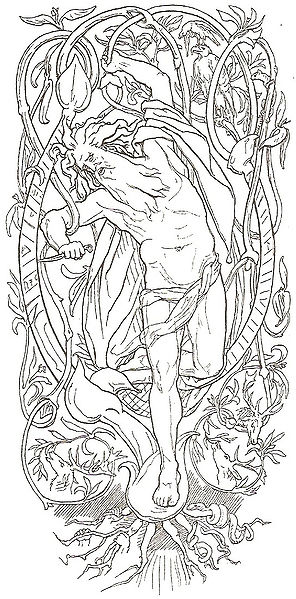
Odin sacrifices himself to himself by hanging from the world tree Yggdrasil,, Lorenz Frølich, 1895
Familiars
Odin is accompanied by his animal companions and familiars. Most important of them are his ravens Huginn and Muninn, The wolves Geri and Freki, and eight-legged steed Sleipnir.
Sleipnir (Old Norse the slipper) is one of the children of Loki. He is an eight-legged flying horse who serves as Odin's mount. Sleipnir is attested as the best horse among the gods and men and as such the only steed worthy to serve Odin. Sleipnir carries Odin across the sky and into the underworld.
Huginn (Old Norse - thought) and Muninn (Old Norse - memory) are two ravens that symbolize Odin's thought and memory. Odin, sitting on his high throne Hliðskjálf, sends out the ravens each dawn to fly all over the world. At dinner-time, Huginn and Muninn return to sit on Odin's shoulders and tell him everything they see and hear. Thus Odin is kept informed about many events from all around the world.
Geri and Freki (both words mean the ravenous or greedy one in Old Norse) are Odin's wolves. Not many sources about the pair remain, and as a consequence, we know very little about them. The only important piece of information concerning Geri and Freki reveals more about Odin than about the wolves. The poem Grímnismál from The Poetic Edda reveals that Odin gives all food from his plate to Geri and Freki, as Odin himself needs only wine. The Prose Edda confirms this information adding that wine is to Odin both meat and drink.
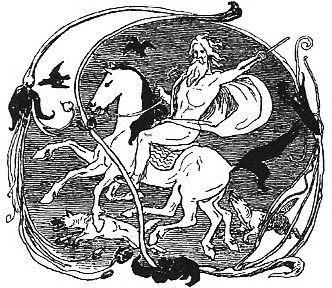
Odin riding Sleipnir, with his ravens Huginn and Muninn, and his wolves Geri and Freki surrounding him, Lorenz Frølich, 1895
If you are interested in more information about Odin; I have written about Odin's role in the creation of the world and humans in my post about creation of the world in The Old Norse mythology; and if you want to know about Odin's end, you can find more about it in my post about Fenrir
Previous articles in Norse Mythology series:
- Norse Mythology˙- Fenrir
- Norse Mythology - The Creation of the World
- Norse Mythology - Yggdrasil, The Cosmic Tree
Sources
- The Poetic Edda
- The Prose Edda - Snorri Sturluson
- Wikipedia
Hail Oden!
Hail!
Hail!
Your post has been selected as #adsactlyspostoftheday :)
Join us in our Discord channel here to drop your post in our post promotion page, and make sure to use the @adsactly tag in the post itself.
Thanks for picking me :) I am already in Adsactly discord channel :D
Very well and beautifully written Arrrados.
My favorite name of Odin is Grimnir.
I approve 100% of everything you wrote here, you have learned well and you promote Norse mythology, for that you will get my 100% upvote and resteem.
Keep doing good work.
It would be great if you write about Thor next! People know Thor from the movies but in the Eddas, he is not like he is in the movies, they need to read the truth.
Thank you for the support! :D I will write a post about Thor, but I am not certain if it will be the next one, it depends on what mood I will be in when I write my next mythology post. I intend to cover most of the major deities from The Old Norse mythology so Thor will certainly be among them :)
Very detailed and informative, a bit cold but then again, all your posts are. This does not diminish their quality, just the opposite, they are very objective and almost article like, very valuable and interesting to read. You did well with this one. I have no objections :)
Haha, I am glad that other Old Norse mythology fan has no objections :D
I intend them to be cold, as purpose of my posts is to teach people about the topics I write about, so I try to find a fine balance between scientific and relaxed style of writing ;)
Thanks for commenting!
I found specially interesting the way he lost his eye and how he got the knowledge of the Runes.
This guy was more about wisdom than I would have thought. I can't believe I knew so little about him. People should praise him more than its "partner" in Greek mythology: Zeus.
I loved the post!
Yup, people usually associate him with war more than with wisdom :) I prefer Old Norse mythology over Greek mythology, but my favorite so far is Slavic which I will write about in future. Thanks for stopping by!
Wow, awesome post
Great post as always! I love how you're passionate about mythology!
Haha, thx :)
I really enjoyed this information. I have always had an interest in different types of mythology and this was so detailed. The images add so much to the content. I will be looking out for future installments.
I am glad you enjoyed it :) I try to write one mythology post per week, but it depends on how much work I have outside of steemit world ;)
Odin is one of the most known Norse gods thanks to the Vikings series ;0) Loved reading this post!
Hey @arrados, I am a curator of the Whaleshares Curation Team. I have selected your post to be presented in a live curation discussion on Monday 14th May. Your post will be awarded a 100 Whaleshares vote on the night. I do hope you can come along and spectate. The event will be held in The Curation Lounge on the Whaleshares server. Here is a link to a post explaining things: https://steemit.com/competition/@nikflossus/the-27th-whaleshares-curation-show-with-yahialababidi
Thanks for picking my post, I am in the show right now ;)